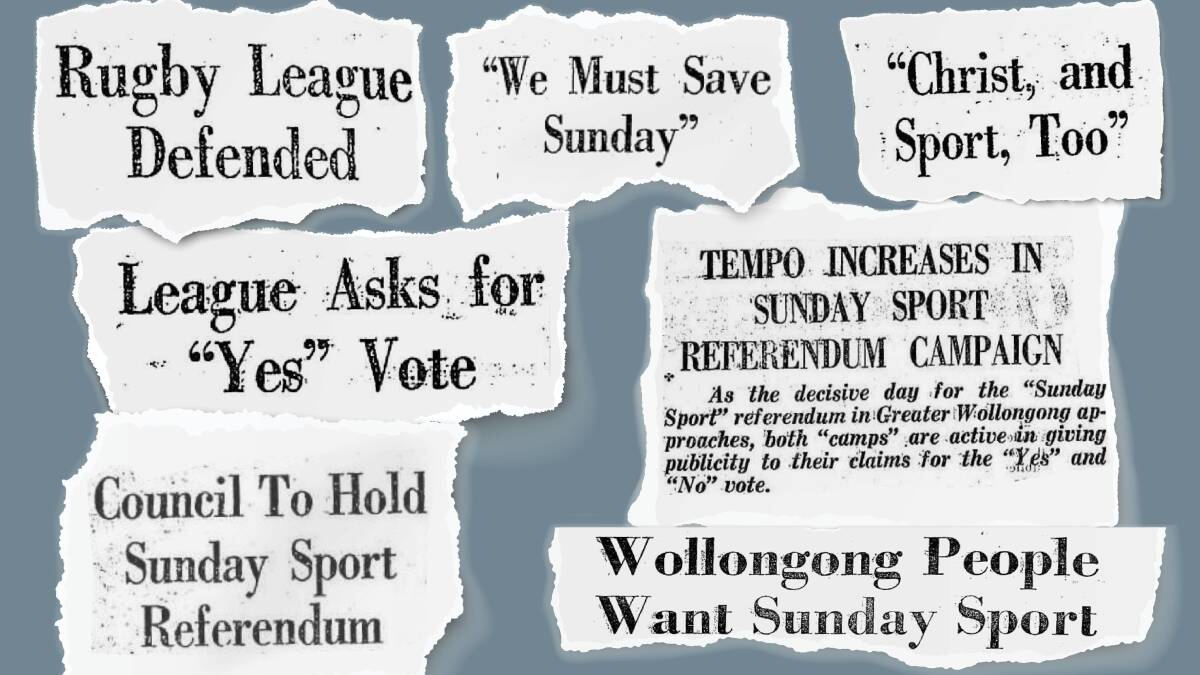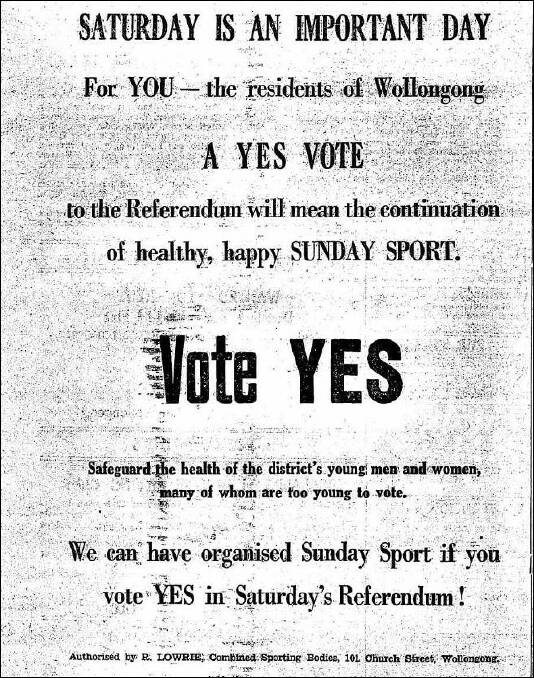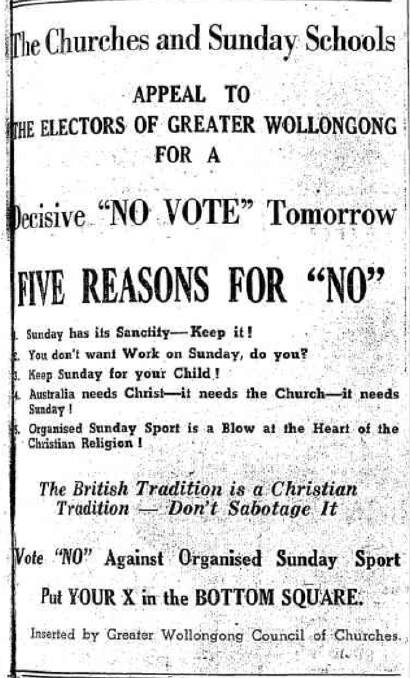
In 1950 there was a very different referendum dividing the city - one that asked whether sport should be played on a Sunday.
Subscribe now for unlimited access.
$0/
(min cost $0)
or signup to continue reading
Weekend sport was very much a thing in the post-war era, with a range of teams taking the field over the weekend.
The city's religious leaders were apparently okay with sport played on a Saturday, but Sunday was a step too far.
Those leaders felt Sunday should be a day for the Lord, and for rest.
"Organised Sunday sport, whether run for profit or not, weakens the church's influence," a committee of Wollongong's church leaders explained, "creates a spirit of excitement and unrest, is attended by considerable barracking and noise and frequently leads to unpleasant partisanship and rivalry."
The group also claimed that Sunday sport "tends to disintegrate family life".
An obvious flaw in their argument was that they were only opposed to "organised sport"; people getting together socially to play golf or tennis was fine. Though why that wouldn't disintegrate family life was never explained.
And so the churches twisted Wollongong Council's arm and, August 1950, it announced a referendum on the issue would be held during the council elections in December.
The question would read "Do you approve the playing of organised sport on Sunday?"
If successful, the vote would only apply to Sunday sport played on council-owned facilities.
Reading between the lines it was clear to see that the role of the church was becoming less important or relevant to people's lives - and the church didn't like that at all.
A day after the referendum was announced, the churches got their first indication that they were in for a hiding; in a street poll a Mercury reporter could not find a single person opposed to Sunday sport who was willing to go on the record.

The only person opposed to it that the reporter could find was a city department store manager - though he declined to give his name.
"My staff is supposed to rest over the weekend and instead they play sports and come in for work on Monday mornings dog-tired," he said.
The churches also soon realised the phrasing of the referendum question was causing confusion.
Whether intentional or not, virtually all sporting groups began claiming the phrase "organised sport" meant all sports.
"This term will cover all public, private and social sports played in this district," the Illawarra baseball league president J Irvine said.
Repeated denials by the churches bore no fruit and so a month out from the vote it asked the council to add the word "commercialised" to the question. The council sensibly said no.
Much of the debate over whether to vote "Yes" or "No" was fought out in the letters pages of the Illawarra Mercury.
As expected, the local rugby league clubs were opposed to the plan; Corrimal club president Tom Comerford suggested footy was keeping young men on the straight and narrow.
"Organised Sunday sport is one way of keeping young people from poker dens and unreliable places," he said.

Illawarra District Rugby League president R Lowrie wasn't quite so dramatic.
He did make the very good point that many of those playing Sunday sport were youths and therefore would not be able to cast a vote on something that could directly affect them.
"It is felt that in rugby league circles and amongst the sporting public in general that the proposed ban is motivated by misplaced zeal," he said, " which could be more worthily be expended in other avenues."
Illawarra Women's Basketball Association Secretary Lola Kinnane said forcing all sport to be played on Saturday would lead to a shortage of grounds and players.
"If all women's sport were played on Saturday, half of it would go out of existence," she wrote in a letter to the Mercury.
Gordon Begbie from St Michael's in Wollongong saw the referendum as a vote on whether the spiritual or the material is more important on Sunday.
"Although this country is still called a Christian country, " he wrote, " we must face the fact that over 90 per cent of its people put their own wishes and desires before those of Jesus Christ."
Superintendent JG Hartnett from the Methodist Sunday School said the referendum was an "extremely important one".
"It is whether we are to permit the gradual encroachment of secularism on Sunday, with its accompanying paralysis of the moral and spiritual vitals of the community, and its attendant commercialism, which must inevitably lead to a complete breakdown of Sunday as a day set apart, and peculiar from the other days of the week," he wrote in a letter to the Mercury.
Both sides took to it like a political campaign; posters advocating a Yes or a No vote were stuck up in shop windows, how to vote cards were printed and ads taken out in the Mercury and on local radio stations.
But, as anyone except the churches could have predicted, the attempted ban on Sunday sport failed spectacularly.
Just 8439 were opposed to Sunday sport, with a whopping 23,043 Wollongong residents supporting it.
Of the 15 wards in the City of Greater Wollongong the "Yes" won convincingly in all of them.
The morale to the story, one which the churches ignored to their peril, is don't get in the way of an Australian and their sport.
Our news app has had a makeover, making it faster and giving you access to even more great content. Download The Illawarra Mercury news app in the Apple Store and Google Play.


